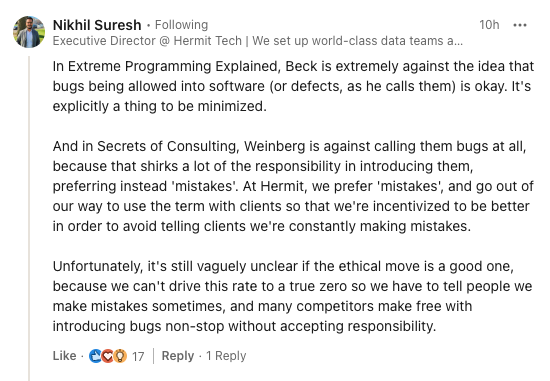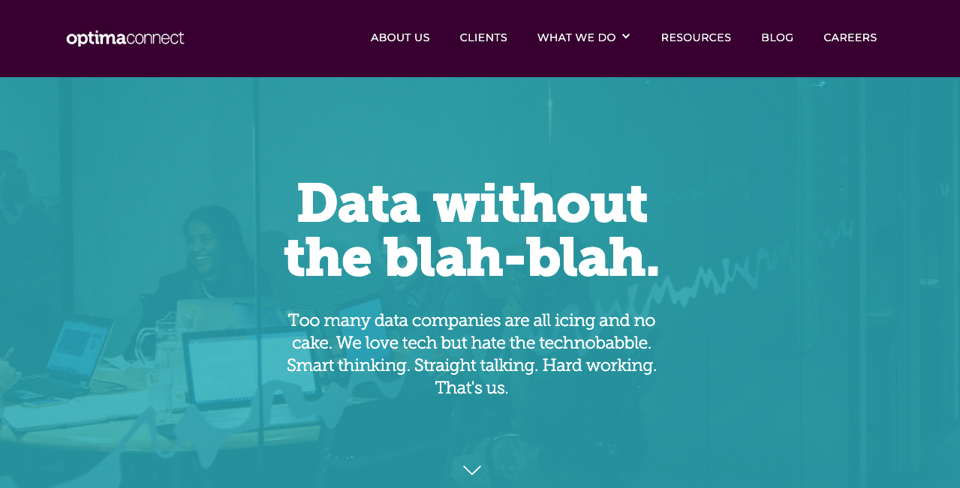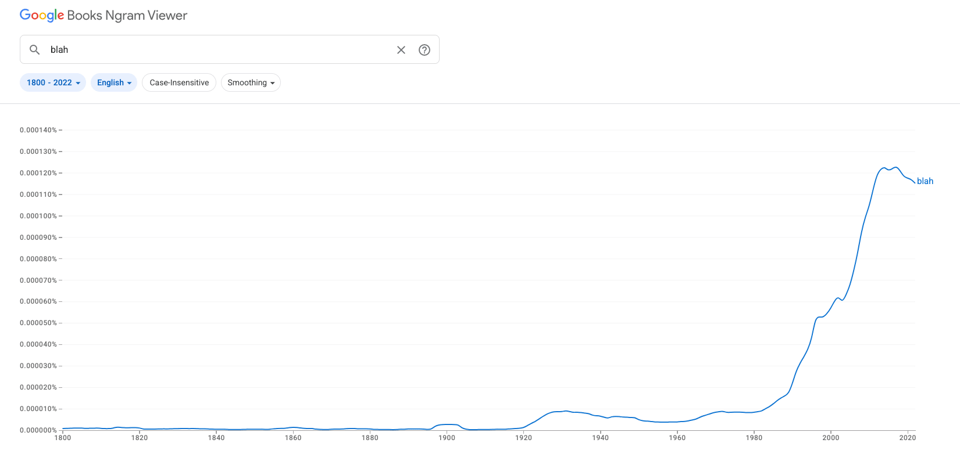A masterclass in owning your mistakes
A post that shows how choosing just one word over another doesn’t just speak volumes, it changes everything.
Wit and principles are a potent brew
Meet Nikhil.
Nikhil Suresh works at an Australian data science company called Hermit Tech. He caught my eye with the humour and radical candour of his writing. Here are the opening sentences on the Hermit homepage if you don’t care to click the link.
The core insight at Hermit Tech is that the vast majority of advice available in the data space is absolute nonsense. Businesses are rushing to implement data initiatives, failing horribly due to a lack of engineering discipline or a coherent philosophy, then covering it up.
From the Hermit Tech homepage header panel
Challenger brands make enemies on purpose. It gives them something to rail against. And well-directed railing is a source of charisma.
Nikhil is picking a fight with a conspiracy that sustains an entire industry: the conspiracy says you can solve any data problem if you buy lots of shiny new technology from vendors who should know better but don’t; or who do know better but but don’t care. (Capitalism.)
Nikhil deservedly went viral with his smash-hit, pull-no-punches post, “I will fucking piledrive you if you mention AI again.” It’s worth a read. If you didn’t click the first link, you should click this one. As you’ll see, Nikhil is a natural when it comes to matters of voice.
I don’t know Nikhil from Adam but I like his style, which is also Hermit’s style. Wit and principles are a potent brew.
Mistakes are a feature and definitely not a bug
As a matter of principle, Hermit rejects the idea of bugs in its code. Instead, it calls them what they are: mistakes.
Hermit sees bugs as another tacit conspiracy. Developers use the word bug as a frame. The frame says that bugs are an inevitable outcome of the coding process, for even the most talented developers. Bugs are seen by both buyer and vendor as the acceptable casualties of software development; like there’s nothing you can do about them; like code has a mind of its own and slips in those pesky bugs when no one’s looking.
Here’s an excerpt from a comment that Nikhil posted in response to a recent LinkedIn post:
And in Secrets of Consulting, Weinberg is against calling them bugs at all, because that shirks a lot of the responsibility in introducing them, preferring instead 'mistakes'. At Hermit, we prefer 'mistakes', and go out of our way to use the term with clients so that we're incentivized to be better in order to avoid telling clients we're constantly making mistakes.
Nikhil Suresh, Executive Director, Hermit Tech
Here’s a screenshot of his full comment, with alt text.

Hermit don’t say bug, they say mistake.
They choose one word over another and change everything in the process. One word speaks volumes about professionalism and integrity. One word is a principled stance that distances Hermit from (I’m guessing) all of their competitors. And it seems to be working. I follow Nikhil on Mastodon and this is from the end-of-year blog post that he shared on there:
To the best of my knowledge we have beaten every competing consultancy after one call. We sometimes lose deals to a client deciding to do nothing (which is actually the number one issue for sales teams everywhere), but no one has ever picked another consultancy over us if they got as far as talking to us, and every client has expressed a strong intention to re-engage us. And we're more expensive than any consultancy I've ever worked with at a big company, so we must be doing something right.
From Merry Christmas ya filthy animals, by Nikhil Suresh
My verbal identity isn’t as pronounced as Nikhil’s, but I do make decisions about individual words. There are words that I consciously avoid in my professional writing: ecosystem, engagement, content, to name a few. They’re loose words that betray loose thinking.
Mistake not bug. Is this strategy as language or language as strategy? It’s clearly both. Hermit’s principles are reflected in its choice of words (word singular in this case). And its choice of word is effectively a public oath on behalf of its people, a standard to which they’re happy to be held.
This is the second time in recent posts that I’ve mentioned Mark Pollard’s idea that ‘strategy is your words’. That’s because he’s so right.
Positive pressure
In principle it’s good for Hermit to own its mistakes. It screams integrity. However, in practice, no one wants to be telling clients they screwed up all the time, especially when the competition is doing the opposite.
So choosing mistake over bug in public puts positive pressure on everyone to make fewer mistakes. Hermit’s verbal identity choices put positive pressure on everyone to raise their game.
The brand works externally to project Hermit as a beacon of professionalism. And it works internally as a standard to live up to. By contrast there’s no built-in incentive to reduce bugs when they’re seen as routine.
By coincidence
I worked with a data science company in Scotland in 2023. Optima Connect has a similar stance to Hermit. They offer integrity and sleeves-rolled-up pragmatism in an industry of hyperbolic, silver-bullet tech stacks. I spoke to several of Optima’s clients, who love them for who they are.
My strategy work is confidential, but I had the pleasure of working again with my longtime colleague Gerry Farrell, who turned my brief into an idea and chef’s-kiss copy that works for Optima in a similar way to Hermit’s verbal identity. It sells their irresistible truth to the market. And it puts positive pressure on everyone to live up to that truth through their work.


An epidemic of blah
It seems that the first recorded use of ‘blah’ as we know it today was in 1918. Google’s Ngram Viewer (see below) shows the popularity of blah in English-language books over time. Blah is a curse of modern life. An epidemic of blah started circa 1982.

There are encouraging signs of a decline in blah from 2017. Perhaps because there are more Hermits, more Optimas, more Nikhils out there, writing the good write. It would be nice to think so.
Here endeth Nikhil’s masterclass in owning your mistakes.
At the risk of being piledriven by Nikhil…
…I’m going to mention AI.
My attitude to AI is one of extreme, McCluhanesque scepticism. It seems to me that the AI industry is more guilty of overpromising on unproven technology than the data engineering charlatans that Hermit and Optima are competing against.
However, there are also oases of integrity and pragmatism in AI.
One of them is my ex-colleague and all-too-infrequent mucker, Phil Dearson.
Phil and I worked together back in the early days of the digital marketing boom. There were lots of snake oil merchants then too, deliberately using arcane language and putting technology in black boxes, for which they ridiculously overcharged.
Phil stood against all that. He knew the tech inside out, but prioritised people and made things that offered genuine utility.
He’s at it again, launching a venture called Volcano Base (think You Only Live Twice.)
Volcano Base offers small, specific, packaged systems that use AI and other tech to do genuinely useful jobs for small businesses.
Phil’s customer sweet spot is independent UK businesses with 2 - 5 people. He’s identified common use-cases where the impact of AI-based automation for these firms can be huge. And small firms can deploy targeted AI much quicker and more effectively than large ones. Phil also thinks there are going to be many more 2 - 5 people firms in the coming years as droves of senior, smart people either leave or are ejected from the world of Enterprise and decide to do their own thing.
I’m working on a post about five years as an independent consultant, which I’ll publish on 1st March (Day 1 of Year 6.) The short story is that it’s always hard and sometimes rewarding.
Phil is just a few days into Year 1. He knows what he’s doing and I trust him. Hence the plug. There’s nothing in it for me. I just want him to do well. Have a look at what he’s up to and please send business his way if you are someone, or if you know someone, who fits his bill. Thank you.
Maybe try this too: Strategy as a foreign language

Add a comment: